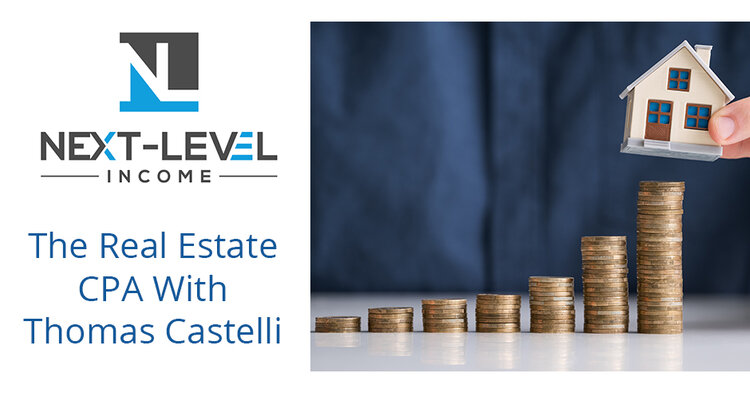Subscribe to The Next-Level Income Show
Taxes are some of the biggest headaches you will ever have as a real estate investor. How do you keep more of your hard-earned dollars in your pocket and out of the government’s? The Real Estate CPA can help you with that. As one of the firm’s partners, Thomas Castelli , shares his insights and strategies in this conversation with Chris Larsen. Thomas is a tax strategist and real estate investor whose real-life investing experience combined with his ever-growing arsenal of hard-hitting tax strategies allows him to see eye-to-eye with clients in ways an average CPA does not. Listen in as Thomas discusses what tax strategy will look like under the new administration and how you can position yourself favorably in the current real estate market.
Watch The Episode Here:
Listen To The Podcast Here:
Ep. 52 The Real Estate CPA With Thomas Castelli
In this episode, we have Thomas Castelli of The Real Estate CPA. Thomas is a tax strategist and real estate investor who helps other real estate investors keep more of their hard-earned dollars in their pockets and out of the government. This is part two of the Next-Level Income strategy of make, keep and grow your money. His real estate investing experience combined with his ever-growing arsenal of hard-hitting tax strategies allow him to see eye-to-eye with clients in ways an average CPA never could.
—
Thomas, welcome to the show.
Chris, thank you so much for having me on. It’s an honor.
I’m looking at sunny skies and spring is around the corner, and so is tax season. That’s why I’m having you on the show. I always love having accountants, but more specifically, tax strategists on the show around this time. Thomas, you and I have talked multiple times. I love what The Real Estate CPA does, what you do, and your understanding of real estate in general. For the audience that doesn’t know much about you, tell us a little bit more about your story and how you ended up where you are now.
I went to college for Accounting, and I then came out during my college years towards the last two years of my junior and senior years. I started getting self-education, I read. The Richest Man in Babylon was the first book I picked up. I went right into the Rich Dad Poor Dad book. That snowballed from there, and along the way, I heard of real estate. I don’t know if the corporate life and the accounting life is going to be for me after hearing everything I heard and I want to explore real estate.
My first step into real estate was my great uncle had passed away, and in his estate was a large property with a small house on it, which is about a two-minute walk from the Long Island Railroad in New York. That railroad goes right into Penn Station in Manhattan. I knew it was a perfect area for a city commuter. That’s a big deal. Around the block from that was a bank. You had a shopping center with a grocery store, pizza place, ice cream place, and laundromat. There’s a subway restaurant, and then around the block from that was the village of Bethpage, which is a big village. I was like, “This is perfect.”
I went to a Long Island Real Estate Investment Association meeting trying to find someone to help like a mentor or someone to help me wholesale, flip the property or something like that. Long story short, that didn’t happen. I could never get my hands on the property in fighting with the estate and what have you. At that event, I learned about real estate syndication. I went to a three-day weekend on a real estate syndication where I fell in love with the model. From there, I started investing as a limited partner in a few deals and eventually, I participated in an event of an 80-unit apartment complex in Jacksonville, Florida, which was exciting. That’s how I got into real estate.
The way to where I’m at with The Real Estate CPA is along the time that that deal happened, that 80-unit apartment complex, I ended up linking up with Brandon Hall, the Founder of The Real Estate CPA on LinkedIn. I was like, “I’m looking to get back into the CPA space again, doing it more in the right direction.” He gave me an opportunity. I took it and ran with it. Now, I’m here with the firm. I’m a partner of the firm and I help a lot of our clients with tax strategy and planning. I have a team of advisors that do the same thing and as well as a bookkeeper. That’s a little bit about me.
Thank you. Brandon is down in North Carolina. Your accent tells us you might be somewhere different. Are you still up in New York?
I’m still in Long Island. I was in New York City for a little, but then at this point, I am eyeing a move to Florida. We’ll see how long I’m still in New York.
I had a conversation with an investor talking about Florida’s massive growth and all the markets there. If you’re on your way down, you should stop by and see us in Nashville here. We get a lot of people. They call them halfbacks. They moved from New York to Florida and halfway back to North Carolina.
A lot of people were telling me that that might be me if I get down there and it’s hot. We’ll see what happens. I like North Carolina, so I could definitely see that being a possibility.
You come visit, I’ll come visit you, let’s make a deal. I know the answer to this, but The Real Estate CPA, it’s catchy. Why did you come up with that name? What is your specialty? Do you work with small investors or large investors? Who are your clienteles? Why did you decide to go with that moniker?
Brandon came up with the name a few years back, it happened to be a clever name on what he was doing at the time, providing CPA services to real estate investors. It made sense to go with that name. It’s a great name, by the way, I’m wearing a shirt with it. That’s how that happened. As for who we work with, we do work with investors across the spectrum. We have clients with one single-family rental to clients with large portfolios of single-family rentals and multifamily rentals. We work with syndicates. Our largest client is a $100 million fund. We do work across the spectrum, flippers and agents. We focus on the real estate niche, but we’re pretty broad within that niche. All of our clients are in the real estate business or are real estate investors in some way, shape or form.
You provide tremendous value. I’ve listened to a lot of the stuff that you guys have put out. Most specifically, you and Brandon did a whole instruction guide about real estate professional status, which is talked about a lot in the industry. For some readers, that might be the first time they’ve heard it, but if you are a real estate investor, you’ve probably checked this out. Tell us a little bit about what real estate professional status is and why the IRS likes to target that. Why is it dangerous to get into if you don’t know what you’re doing? Ultimately, the resource that you all you guys put together.

The Real Estate CPA: The real estate professional status allows real estate investors to take the losses from their rental real estate and use it against their active income.
The real estate professional status, what it does is it allows the real estate investors to took the losses from their rental real estate and use it against their active income. Their active income could be from a W-2 job or a racket business. It could be interest income. It could be various assorted types of income. The way that came into play, back in 1986, they had the Tax Reform Act of 1986 under the Reagan Administration.
Prior to this time, you could buy a rental property, depreciate it, and take the losses against your income. People started to abuse it. What they did was they put Section 469 of the Tax Code, which is passive losses. Basic passive activity rules. They said that all rental activities are, by default, passive, meaning you can only use the loss to offset other passive income. For real estate investors, for the most part, that means other rental income or capital gains from the sale of your rental.
A bunch of people in the real estate industry started complaining. They start saying, “How come it’s fair for a doctor who owns a medical practice to depreciate their medical equipment and take their losses against their income? We’re in the real estate industry full-time. This is what we do. This is our bread and butter. We develop or we’re an agent. Why can’t we do the same with our rental properties?” In 1994, they introduced the real estate professional status, and in real estate professional, you spend at least 750 hours in a real property trader business. It must represent more than 50% of your total working time.
What this was designed to do is it will allow people who are in the real estate business full-time to use their rental losses against their other income, presumably from real estate. The reason why it’s dangerous is because as you can imagine, there are a lot of high-income earners, a lot of high-net-worth individuals out there who are paying a lot of money in taxes, the 37% tax bracket. At the federal level, it’s tough. You start looking at the numbers, you see people paying hundreds of thousands of dollars in taxes and when you look at your effective tax rate, it’s sometimes 40% or more.
In California, sometimes, it’s more than 50%.
It is and we’ve seen stuff like that before. It gets to the point where it’s painful. People are highly motivated to try to get a professional status. The IRS and the tax courts know that. It’s one of the most highly litigated parts of the Tax Code. There are over five Tax Court cases on it. We see audits on this all the time. Most of the time, people were trying to abuse the rules. Unless you know what you’re doing and put your gut in your teeth, crossing your t’s and dotting your i’s, you can get into some trouble there if you abuse that.
That’s one of the reasons we connected. Making sure that I understand this rule. I remember my accountant was like, “Don’t go there. You got to know what you’re doing when it comes to that.” I’ve heard people say, “I’m going to do this.” I would say, “You should talk to somebody who knows that.” That brings up another point. I talked about it in my book. We have the make, keep, and grow strategy at Next-Level Income. I always tell my clients, I talk to investors, “Find out how to make more money, then you can ultimately invest more, but also keep more money.”
The three things I talk about are proper tax strategy, entities and life insurance. A lot of people are like, “Why have an accountant, Chris?” I have an accountant. I took a course when I was in college from a former IRS agent. What I learned was accountants are like TurboTax. They don’t necessarily do anything but take your receipts and do that. I always asked, especially the people I coach, “Do you have a tax strategist?” Normally, they say, “I have an accountant.” “Do they come to you and tell you how to structure your entities? Do they tell you what to invest in or do they just file your taxes at the end of the year?” Tell us what is the difference between a tax strategist and an accountant?
You have a lot of taxpayers and accountants CPAs out there who file tax returns. That’s their core business. They want to file as many tax returns as they can before the deadline. That’s their objective. The problem is, the tax return, at the end of the day, is simply a report card of the activities, the income expenses, deductions and etc. that you had from the prior year. When you’re on your tax return in Q1 2020 for the 2020 year, the 2020 year is already over. What happened in 2020 is done. There’s no way to go back and change it. There are some things you could do after the year ends, but it’s not significant.
At the end of the day, the actions and the strategies you’re employing or not employing throughout the year will impact your tax liability and your taxable income when you go to file your tax returns. While most CPAs will just prepare your return based on what will happen next year. The tax strategist is sitting down and saying, “Based on where you are now, your current circumstances, on your goals for the future, and where you’re looking to go, here are the strategies you’re going to need to employ. Here are the actions you’re going to need to take throughout the year to make sure those strategies get implemented in order to impact your taxability when it does come time to file that tax return,” which is the report card of the income, expenses and deductions, etc. from the year prior.
I’ve heard people say, “I have an accountant. I’m happy with them.” Do you work with investors? Do you work with business owners that already have an accountant? Are they happy, Thomas or do they have to work with you? How does that work?
We work with both clients who come to us and they move everything to us. We work with clients just on consulting on the real estate side. To answer that question, it depends. If you have a good accountant and they’re rock solid. You just need some targeted real estate advice for certain aspects of your business, portfolio, that could work well if your accountant is sophisticated enough to go and report those things on your tax return.
The challenge I see us running into sometimes is the real estate part of the tax code is rather complicated when you look at a generally small business. You have a lot of CPAs who don’t understand the aspects of that. When we give them the strategy, they go back to their current CPA. The CPA either is conservative and scared to implement some of those strategies such as the real estate professional status or doesn’t know how to report some of the more complex aspects of it. We’ve done it on both sides. It works better if we’re working with you exclusively because we’re able to handle all sides of the action, if you will, for lack of a better term.
If you’re reading, you have a business, you’re an active investor, and you don’t have a tax strategist, that’s the first thing you should do when you finish reading to this blog, or pause it and say, “Where do I find one of them?” Give Thomas and his group a call, check out our website for resources, especially with real estate, these guys are the pros. It’s huge on that. At the end of 2017, we had some great tax changes that came into play that has been wonderful for investors over the past few years here with the Tax Cuts and Jobs Act. Tell us when is that sun setting, Thomas? What effects should real estate investors be looking out for? Also, any potential changes that you think are coming with the new administration that’s coming up, and what can we do to prepare for that?
The Tax Cuts and Jobs Act and many the things in there will be sunsetted in 2026 as it stands. The biggest item for many real estates is going to be 100% bonus depreciation. It allows you to depreciate assets with a class life for twenty years. For most real estate investors, that is going to be tangible personal property, things like appliances or land improvements, landscaping, driveways, fences, or things of that nature. You could depreciate those all in the first year. You place that property in service, which for the most part, is going to be the year you acquire but not always.
That’s significant because somewhere between 20% and 30% of the buildings can generally be depreciated. For example, a $100,000 property, you’re looking at somewhere between $20,000 and $30,000 deduction, which can be significant if you’re in the higher tax brackets. That’s by far the biggest one. That is phasing out in 2023. It’s going to drop 80% bonus depreciation. In 2024, you’re going to be at 60%. In 2025, you’re going to be at 40%. In 2026, you’re going to be at 20%, and then in 2027, it phases out as it is now. There are no plans that know what’s going to happen with that.

The Real Estate CPA: A hundred percent bonus depreciation allows you to depreciate assets with a class life in 20 years. For most real estate investors is going to be a tangible, personal property.

The Real Estate CPA: Take a look at the biggest demographics in the country and put yourself in a favorable position so that when they come to you, you’re ready to go.
This is why I love having you on the show. You understand the investments and what your clients are doing because you’re doing it yourself. You’re thinking about the future and what they can be doing. You have a podcast, Thomas. You provide a lot of value through your education, which is our mission here at Next-Level Income. Please share with the audience a little bit more about your podcast, what you guys focus on, and what’s the best way for people to get a hold of you?
The podcast is The Real Estate CPA podcast. We do episodes, we do interviews like this, we talk about people’s investment strategy, what they’re doing to build their businesses, and their investment portfolios. We have attorneys on to talk about asset protection. We do deep dives into tax strategies. In fact, we have a four-part series that’s going to be released on the real estate professional status where I and Brandon go deep dive into the real estate professional status over four episodes. That’s going to be exciting. For the best way to contact me, you could email me at Contact@TheRealEstateCPA.com. We have an assistant who monitors that consistently. We get a lot of emails to my personal inbox. It’s tough for me to respond to all of them.
We appreciate you being on the show. I always ask every guest that’s on, if could you go back to your 25-year-old self and give you one piece of advice, what would it be?
It would be invest money in Bitcoin.
I was listening to a book when I went to drive back home. I’m looking at Amazon on how they’ve overtaken the market. We’re talking about Sears going bankrupt and Amazon. Bitcoin, Amazon and real estate.
Netflix, Facebook and Tesla. In hindsight, it’s 2020. If I had a time machine, that’s what I would do.
There you go. Thomas, thank you so much for being on. We appreciate it. I hope you do well. Enjoy tax season.
Thanks for having me on. It was a pleasure.
—
Chris here again. I hope you found this episode valuable. I have one more gift for you. If you haven’t yet gotten my book, Next Level Income, and would like me to send it to you in the mail for free, then go to NextLevelIncome.com and click on the Book tab. If you fill out the form on that page, I will send you a copy of my book and cover all the shipping costs as a thank you for being a reader. Also please like, share and take 90 seconds to give us a rating on Apple Podcasts.
Important Links:
-
Bill Exeter – previous episode
-
Book tab – Next Level Income site
-
Apple Podcasts – Next-Level Income podcast
About Thomas Castelli

Thomas Castelli is a Tax Strategist and Real Estate Investor who helps other real estate investors keep more of their hard-earned dollars in their pockets, and out of the government’s.
His real-life real estate investing experience, combined with his ever-growing arsenal of hard-hitting tax strategies, allow him to see eye-to-eye with clients in ways an average CPA never could.
Love the show? Subscribe, rate, review, and share!
Join the Next- Level Income Show Community today:
Tagged: The Real Estate CPA, Tax Strategy, Real Estate Investing, Real Estate Tax, Real Estate Professional Status, Asset Protection, Group 2


Subscribe to The Next-Level Income Show